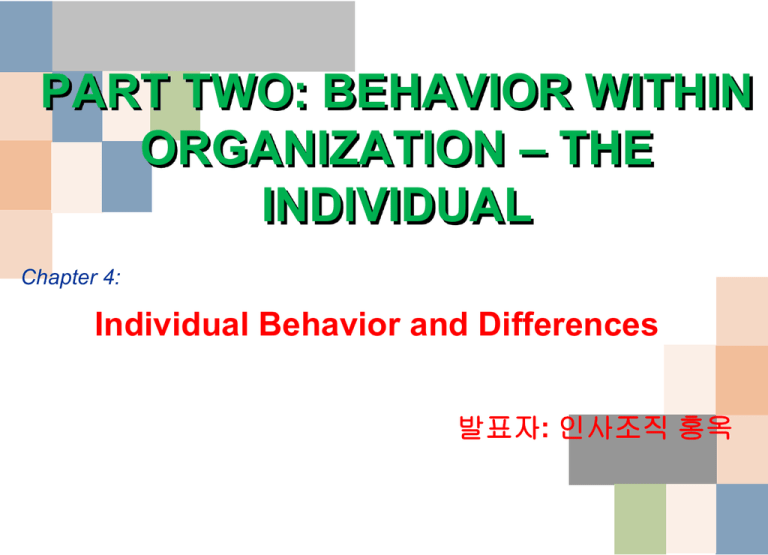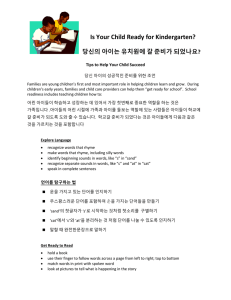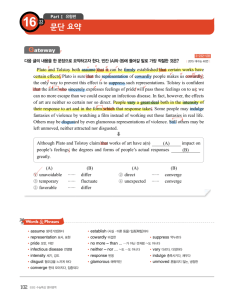
PART TWO: BEHAVIOR WITHIN
ORGANIZATION – THE
INDIVIDUAL
Chapter 4:
Individual Behavior and Differences
발표자: 인사조직 홍옥
학습 목표
McGraw-Hill/Irwin
Define: perception and explain its role in
understanding and coping with organizational
life.인식의 정의와 이해 및 조직생활에 대처에
대한 인식의 역할을 설명
Describe: 자기효능감은 고용인의 행동에 어떤
영향을 미치는지를 묘사
Compare: the meaning of the psychological
contract from the employee and the employer
perspective.고용인과 고용주의 전망에게 심리적
계약의 의미를 비교
Explain: 인 간 의 태 도 를
어려운지를 설명
변화시키기가 왜
© 2006 The McGraw-Hill Companies, Inc. All rights reserved.
The Basis for Understanding
Behavior
Variables that influence individual
behavior include: 개 인 행 동 에 영 향 을
미치는 가변성
Abilities and skills 능력과 기술
Background 배경
Demographic variables 인구 가변성
Whether any manager can modify, mold,
or reconstruct behaviors is much debated
among
behavioral
scientists
and
managerial practitioners. 매 니 저 가
고용인의 행동을 수정하거나 재건할 수
있는가 행동 과학자들과 매니저들의 논쟁
중인 문제
The Basis for Understanding
Behavior
B=?
B=f(I,E)
Individual Behavior Framework
The
Environment
환경
The
Individual개
인
Behaviors
행동
Outcomes
결과
Individual Behavior
To understand individual differences, managers must: 개 인 의 차 이 를
이해하기 위하여 매니저가 해야 하는 것
Observe and recognize the differences차이를 관찰하고 인정하는
것
Study variables that influence individual behavior 개 인 행 동 에
영향을 미치는 가변의 요소들을 공부하는 것
Discover relationships among the variables 가 변 의 요 소 들 의
관계를 발견하는 것
Individual Behavior
Questions to help managers focus on performance problems:매니저가
실행문제에 집중할 수 있게 해주는 질문
Does the employee have the skill/ability to perform the job?고용인이 직무
실행할 능력/기술을 가지고 있는가?
Does the employee have the resources to perform the job? 고 용 인 이
직무실행할 자력/기지를 가지고 있는가?
Is the employee aware of the performance problem? 고 용 인 이 직 무
효과문제를 인식하는가?
When did the performance problem surface? 언제 실행문제가 나타났는가?
How do the employee’s co-workers react to the performance
problem?고용인의 동료들이 실행문제에게 어떻게 반응하는가?
What can I do as a manager to alleviate the performance problem?매니저가
실행문제를 완화하기 위해 무엇을 해야 하는가?
Individual Differences
Abilities and Skills능력과 기술
Some employees, although highly motivated, simply don’t have the abilities or
skills to perform well 높은 동기가 있지만 잘 실행할 능력과 기술이 없는
고용인이 종종 있다.
Ability is a biological or learned trait that permits a person to do something
mental or physical 능력이란 개인이 어떤 일을 수행하는데 있어 신체적으로나
정신적으로 지니고 있는 잠재적 힘이나 재능의 최대치를 의미한다.
Skills are a task-related competencies. 기능이란 직무에 관련 능력이다
Individual Differences
Job Analysis직무 분석
The process of defining and studying
a job in terms of behavior and
specifying education and training
needed to perform the job. 직 무 를
연구하고 정의 하는 과정에 의하여
어떤 직무를 실행하기 위한 필요한
교육 및 훈련을 연구하고 정의하는
과정
Demographics
Among the most important
emographic classifications
re:가장 중요한 인구 분류
Gender성별
Race인종
Cultural diversity 문화 차이
Individual Psychological
Variables개인 심리적인 가변성
Perception
Emotional
Intelligence
Personality
Attribution
Attitudes
Perception
인지란 외부로부터 들어오는 자극들에 대한 선택적인 주의 집중으로 정의된다.
즉, 개인이 외부 환경의 자극이나 정보를 감시하고,이에 대해 의미를
부여하거나 해석하고,그에 따른 적절한 행동을 결정하는 감각적,
심리적 과정을 의미한다.
Perception is based on five senses 인지는 다섯 센스를 바탕으로한다
Sight 시각
Touch 감각
Hearing 청각
Taste 미각
Smell 후각
Perception helps individuals select, organize, store, and interpret stimuli into a
meaningful and coherent picture of the world.인지는 개인에게 자극을 선택,
조직, 저장 및 세계의 의미 있고 일관된 그림으로 해석하게 도와준다
Perception
지각에 영향을 주는 요소
1.학습과 경험
2. 자아개념
3. 인성
4. 가치
5. 신체적 특성
6. 사회적 특성
7. 언어 및 비언어
8. 상항적 요인
Perception
Examples of How Perception Influences Behavior 인식은
행동에 어떻게 영향을 미치는지 보여주는 보기
- A manager believes that an employee is given opportunities to use judgment
about how to do the job; the employee feels there is no freedom to make
judgments 매니저는 고용인이 일을 어떻게 해야 될지 판단할 주어진 기회가
있다고 믿지만 고용인은 판단의 자유가 없다고 느낀다.
- A subordinate’s response to a supervisor’s request is based on
what she thought she heard, not on what was actually
requested.감독자의 요구에 하급의 반응이 자체 요구가 아닌 자기의
생각과 들었던 것에 기초를 둔다.
- The manager considers a product to be of high quality, but the
customer feels that it is poorly made. 매니저는 제품이 고급
품질이라 생각하지만 소비자는 질 낮은 제품이라 느낀다
Perceptual Differences and Behavior
Manager’s
perception매니저의 인식
Worker has lots of freedom to
make decisions고용인이 결정할
많은 자유가 있다
Manager’s behavior 매니저의
행동
No concern about freedom
given to worker고용인의 자유에
아무 관심이 없다
Manager’s behavior
매니저의 행동
Puzzled by the absence
record of worker 고용인의
결석으로 곤혹한다
Freedom
worker is
given
Worker’s perception
고용인의 인식
I am not given freedom to
make decisions결정할 자유가
없다
Worker’s behavior 고용인의
행동
Feeling of being left out
Staying home근무하지 않고
집에 있다
Worker’s behavior 고용인의
행동
Belief that no one really cares
관심을 갖다 주는 사람 아무도
없다고 믿는다
Stereotyping
An over-generalized, over-simplified, and self-perpetuating belief about
people’s personal characteristics 인간의 개인적 특성에 대한 과도하게
일반화되고 간소화되고 유임하는 믿음
사람을 평가하는데 있어 그 사람이 속한 집단의 특성에 대해 자신이 지니고 있는
고정관념이나 선입관 때문에 단정적으로 분류해 버리는 지각의 오류를 정형이라고 한다.
Most people engage in some sort of stereotyping, both of people and of occupations
인간과 직업은 대부분 어떤 정형에 관여한다
Stereotypes are self-perpetuating; people tend to notice things that fit their stereotype and
not notice things that don’t 정형은 유임한다; 인간은 자기의 정형에 맞는 것에만 관심 있는
경향이 있다
The inaccuracy of stereotyping can result in unfair programs for promotion, motivation, job
design, or performance evaluation 불확정 정형의 결과로써 승진, 동기, 직무설계와 효과
평가하는 프로그램이 불공평하게 된다
Situational factors, needs, and emotions can affect perceptual accuracy 상황에 따른 요소,
요구, 감정이 지각의 정확성에 영향을 준다
Attribution
The process of perceiving the causes of behavior and
outcomes.행동과 결과의 원인을 인식 과정
Dispositional attributions: emphasize some aspect of the individual, such as
ability or skill, to explain behavior 기질적 귀인은 사람의 능력, 기능과 같은
면을 강조해서 그들의 행동을 설명하는 것
Situational attributions: emphasize the environment’s effect on behavior 상황적
귀인은 행동에 미치는 환경의 영향을 강조하는 것
When attempting to decide whether a behavior should be attributed to the
person or to the situation, consider 어떤 행동은 인간이나 환경의 탓인지를
판단할 때는 고려해야 할 점.사람들이 귀인(또는 탓을 하기 전에 세
가지 행동차원에서 정보를 수집하고 평가한다.
Consensus 합의성
Distinctiveness 특이성
Consistency 일관성
Attribution
Consensus (합의성):개인의 행동이 다른 사람의 행동과
얼마나 일치하느냐에 관한 것으로서, 특정 행동상황하에서
개인의 행동이 다른 사람의 행동과 똑같을수록 일관성이 높다.
Distinctiveness (특이성):개인의 특정과업에 대한 행동이 다른
과업에 대한 행동에 비하여 얼마나 다르냐에 관한 것으로,
개인의 특정과업에 대한 행동이 다른 과업에 대한 행동에
비하여 많이 다를 수록 특이 성은 크다
Consistency( 일관성): 개인의 특정과업에 대한 성과가 어느
기간 동안 얼마나 일관성 있게 나타나느냐에 관한 것으로,
개인의 성과가 항상 안정되어 있을수록 일관성은 높다
Attribution
An attributional bias is a tendency to prefer one type of behavior
explanation over another.귀인 편향은 어떤 행동을 설명 스타일을
선호하는 경향이다
A fundamental attribution error is making a judgment with only limited
information about the person or situation.원초적 귀인 오류는 한정된
정보로 인간이나 상황을 판단하는 것
Most people have general positivity (the Pollyanna principle), which is an
inclination to be positive. 인간은 대부분 적극적 경향인 일반적 적극성이란
것을 가지고 있다.
A self-serving bias means taking credit for successful work and denying
responsibility for poor work.자기편의적 편향은 성공한 일을 자신의
것으로 하고 실패한 일에 자신의 책임을 부인하는 것
Attitudes
A positive or negative feeling or mental state of readiness,
learned and organized through experience, that exerts specific
influence on a person’s response to people, objects, and
situations. 태도란 개인이 어떤 대상에 대해 가지는 비교적
지속적인 호.불호의 경향성을 말한다.
태도를 나타내는 영어의 attitude는 ‘적합한 (suited)’ 이라는
뜻을 가진 라틴어 ‘압투스’ (aptus)에서 나온 것으로 어떤 대상에
대한 적합한 성향을 반영하고 있다.
태도는 개인의 감정과 사고에 바탕을 두고 있으며 행동의
방향을 결정하는 중요한 요인 되고 있다. 태도에 따라서 그
행동이 긍정적으로 나타나기도 하고 부정적으로 나타나기도
한다.
Attitudes
태도의 구성요소
- 인지적 요소 (Cognitive component): 태도는 인간이 지니고 있는
사고, 아이디어, 신념 등으로 구성되어 있음을 말한다.
-정서적. 감정적 요소 (Affective component): 태도에는 어떤
대상에 대해 좋고 나쁜 감정이 있음을 말한다
- 행동적 요소 (behavioral component): 태도에는 한 대상에
대한 어떤 방식으로 행동하려는 경향이 있음을 말한다.
예)- ‘기분이 나쁘다’ 감정적
- ‘귀신이 없다고 생각한다’ 인지적
- ‘인상을 쓰고 눈치를 준다’ 행동적
Three Components of
Attitudes
Stimuli
자극
Work factors
Job design직무 설계
Manager style매니저
스타일
Company policies회사
정책
Technology과학기술
Salary봉급
Employee
benefits고용인의 이익
Attitudes
태도
Outcomes
결과
Components
Responses
Affect감정
Emotional:
감정적:Statement
about liking 좋아하는
것에 대해 말함
Cognition인식
Behavior행동
Perceptual:
지각:Statement about
belief 신념에 대해
말함
Action: 행동:Statement
about behavior 행동에
대해 말함
Attitudes
Cognitive Dissonance인지적 불협화
A mental state of anxiety that occurs when there’s a conflict among an individual’s
various cognitions after a decision has been made.
결정을 한 후에 개인의 여러 가지의 인식적 갈등이 있을 때에 나타나는 걱정되는 정신 상태
* 인지적 불협화 이론이란 서로 모순되는 두 가지 인지나 견해가 있으면
개인은 의식적이든 무의식적이든 불쾌해지고,
그 결과 불쾌감을 해소하기 위해서 어느 한 쪽을 바꾸려 한다는 이론입니다.
예를 들어 "나는 담배를 피운다."라는 인지와
"담배를 피우면 폐암에 걸릴 확률이 높다."라는 인지는
서로 모순되어 불협화를 발생시킵니다.
Attitudes
Three general factors
affect attitude change
태도변화에 영향을
미치는 일반 요소 3 가지
-Trust in the sender
발송인에 대한 믿음
-The message itself
메시지 자체
-The situation 상황
How to change attitude
1. 자기개조에 관한 서적읽기 및 훈련
2. (self-suggestion)
3. 자기분석 (self-analysis)
4. 역할연기 (role-playing)
5. 설득 (persuasion)
6. 토론 (discussion)
7. 경청 (listening)
8.공포의 유발 및 감축 (fear arousal and reduction)
9. 상담자의 활용 (personnel counselor)
10. 여론선도자의 활용 (opinion leader)
11. 계획적 태도변화 (planned change)
Changing your attitude,
changing your life
데일 카네기 코스 (Carnegie)의 책에서 제시된 태도과 사람을
교정하는 9가지 방법
-먼저 칭찬하는 말부터 시작하라
-과오는 간접적으로 알깨워 주어라
-자신의 과오를 먼저 이야기하라
-명령은 되도록 피하라
-상대방의 체면을 생각해 주어라
-사소한 일이라도 칭찬해 주어라
-기대를 표명해 주어라
-확산을 갖도록 격려해 주어라
-자발적으로 합력하도록 하라
Attitudes
Values: the likes, dislikes, viewpoints, shoulds, inner inclina-tions,
rational and irrational judgments, prejudices, and association patterns
that determine a person’s view of the world 가치관: 세계를 바라보는
시선을 결정하는 좋아하는 것, 싫은 것, 관점, 해야 할 것, 내적인 경향,
합리하고 불합리한 판단, 편견과 조합양식
Once internalized, values become a standard or criterion for
guiding one’s actions. 가치관이 내면화되었으면 인간의 행동을
지도해주는 기준이나 표준이 된다
Values affect the perceptions not only of appropriate ends, but
also of appropriate means to those ends.가치관이 적절한 끝을
인식하는 데에 영향을 미칠 뿐만 아니라 그 끝으로 가는 적절한
방법을 인식하는 데에도 영향을 미친다
Attitudes and Job Satisfaction
Job satisfaction is an attitude that individuals have
about their jobs. It results from their perception of the jobs.직무 만족이란
조직구성원들이 자신의 직무에 대하여 갖고 있는 태도로, 그들이 성취하고자
하는 목표를 자신의 직무를 통해 얼마나 이루어 냈고 또 이룰 수 있는가에 대한
느낌, 인식, 그리고 기대되는 행동 등의 산물이다.
Five crucial characteristics associated with job satisfaction:직무만족과 관한
결정적인 특성 5 가지:
The amount and perceived equity of pay.봉급의 액과 인식된 공평
The extent to which job tasks are interesting and provide opportunities for learning
and for accepting responsibility.의무가 재미있고 고용인에게 공부하고 책임을
받아들일 기회를 줘야 된다
Opportunities for advancement.승진 기회
The supervisor’s interest and concern about employees.고용인에 감독자의 관심과
흥미
The extent to which co-workers are friendly, competent, and supportive.동료들이
친절하고 유능하고 보조적
Satisfaction-Performance
Relationships만족과 실행의 관계
1. Job satisfaction
직무만족
2. Job satisfaction
3. Job satisfaction
Causes원인
“The satisfied worker is more
productive.”만족한
고용인들이 생산성이 더 높음
is caused by
“The more productive worker
is satisfied.”생산성 더 높은
고용인이 만족한다
“There is no specific
direction or
relationship.특별한 관계나
지도 없음”
Job Performance직무실행
Job Performance
Job Performance
Personality성격
A relatively stable set of characteristics, tendencies, and
temperaments that determine commonalities and differences
in people’s behavior 인간의 공통점과 차이점을 결정하는
안정된 상태의 특징, 경향과 성질. 성격은 사람을 남과
구분하기 위하여 사용하는 비교적 변치 않는 신체적, 심리적,
행동적 특징들의 집합이라는 것이다.
Personality
Personality is influenced by:개인에 미치는 영향
- Hereditary factors 유전적 요인
생물학적 요인은 DNA와 같은 유전형질, 생리 및 신경적 작용, 타고난 신체적
구조에 따라 성격이 다르다.
- Cultural factors 문화적 요인
문화는 한 개인이나 집단이 공동생활을 하면서 한 세대에서
다음 세대로 전승되어 같은 사회나 집단의 구성원들은
동일한 문화를 학습하면서 사회화 과정을 통해 공통성이
있는 성격을 형성하게 된다.
- Social factors 사회적 요인
Measuring Personality
Characteristics
- Minnesota Multiphasic Personlity Inventory (MMPI):
미네소타 다면적 인성검사
- Myers-Briggs Type Indicator (MBTI): 성격과 인지스타일을
판단하는 지표.
4가지 인지유형
•Extroverted or introverted 외향-내향
•Sensory or intuitive 감각- 직관
•Thinking or feeling 사고-감정
•Perceiving or judging 인지-판단
Big Five Model
성실성
(conscientousness)
성실: 사고와 행동이 조직적이며 미래에 대한 준비 철저
자유분방: 게으르지만 창의적인 업무에 감정
외향적: 공동업무처리 팀제하에서 감점
외향성
(Extroversion)
내성적: 독자적 공간제공시 경쟁력 제고
우호적: 쉽게 신뢰. 긍정적 시각
친밀성
(Agreeableness)
감정
(emotionality)
냉소적: 의심믾고 주변사람 경쟁자로 의식
민감: 다혈질이지만 서비스업종에선 강점 발휘
둔감: 냉정.침착한 반면 고객감동 부족
개방성
개방적: 자유분방.실험정신 높음
(Openness)
폐쇄적: 꼼꼼하고 큰 실수 없음
Self-Efficacy 자기효능감
The belief that one can perform adequately in a situation. 자기 효능감은
자신이 가지고 있는 지식, 능력, 및 스킬을 적절히 운용하고 조직화하여
동원하는 역량(capacity)에 대한 자신의 신념이다.
Self-efficacy has three dimensions:
자기 효능감의 차원 3가지
Magnitude 거대
Strength 세기
Generality 보편성
A person with high self-efficacy is more motivated to perform at high
levels of achievement.
자신의 역량에 대한 신념은 특정 행동 수준의 선택, 노력의 크기 및 지속성의 차원을
통해서 동기와 행동에 영향을 미치며 고도의 성취를 실현할 수 있다.
자기 효능감과 성과와의 관계는 순환적 관계로, 한번 좋은 성과를 내면 같은 일을
반복하는데 있어 더 높은 자신감을 갖게 되고 이는 더 높은 성과로 이어진다.
Machiavellianism
Machiavellianism is a negative connotation associated with
maneuvering and power manipulation. 마 키 아 벨 리 즘 은 정 치 적
political
수단과
관련됨으로써 수단보다 목적을 중시며, 감정인 것보다 실리적인 것을
추구하는 성향이다.마키아벨리즘성향이 자신의 목표를 달성하기 위해 다른
사람을 잘 조정하고, 논리적으로 설득시키기를 잘한다.
Developing Creativity 창의성
개발
Buffering: Managers can look for ways to absorb the risks of creative decisions
made by their employees.매니저가 고용인들의 창의적 결정의 위험을
흡수하는 방법을 찾아라
Organizational time-outs: Giving people time off to work on a problem and
think things through.고용인이 문제를 해결할 휴식을 주어라
Intuition: 직관Giving half-baked or unsophisticated ideas a chance.불충분한
아이디어나 단순한 아이디어에게 기회를 주어라
Innovative attitudes: 혁신적인 태도: Encouraging everyone to think of
ways to solve problems. 사람이 문제를 해결하기 위한 방법을 찾을
수 있도록 격려해라
Innovative organizational structures: 혁신적인 조직구성Letting employees
see and interact with many managers and mentors.많은 메니저가 멘토와
만나고 상호 작용하게 해라
Emotional
감정지능
Intelligence
Emotional intelligence is the ability to accurately perceive,
evaluate, express, and regulate emotions and feelings.감정,
감각을 정확하게 인지, 표현, 평가,조절하는 능력
샐로비( Salovey ) 의 감정지능
• 자신의 감정을 자각하는 능력
•자신의 감정을 조절하는 능력
• 자신에게 동기를 부여하는 능력
• 타인의 감정을 지각하는 능력
• 인간관계를 관리하는 능력
The Psychological Contract
심리적 계약
An implied understanding of mutual contributions
between a person and his or her organization.
사람이 조직에 대한 직업을 수용 할 때 암묵적인 심리학적 계약이
이루어진다.
관념, 권능, 태도, 가치 그리고 일반적인 성격의 차이 때문에
개개인들은 심리학적 계약에서 타고난 개인적인 예상 견해를 형성한다.
심리학적 계약은 사람 사이에 글로 써진 문서가 아니라 상호간 기여의
이해를 암시한다.
The Psychological Contract
심리적 계약
- 사람들은 조직에서 이러한 지각을 가지고 있다.
예를 들어 직원들이 만약 그들이 열심히 일하고 충성을 비춘다면 조직은 좋은
근무 조건과 안정적인 직업을 제공할거라고 아마도 가정 할 것이다.
- 심리학적 계약은 약속들이 개인과 조직에 의해 만들어져 온 신뢰이다. 즉 심리적 계약은
조직과 구성원 사이에 체결되는 일종의 묵시적인 계약으로 계약 당사자들은 상호 의무와
권리를 가지게 된다.
예를 들어, 회사에서 마케팅 직원을 선발했다면 회사는 이들에게 직무와 관련된
전문지식 교육을 실시할 의무를 가지는 동시에 이 교육을 통해 직원들이 좀 더 나은 성과를
창출하도록 요구할 수 있는 권리를 가진다. 반면에, 직원들은 자신이 요구하는 양질의
교육을 받을 수 있는 권리를 가지는 반면 그 교육의 효과를 통해서 조직 성과 창출에
기여해야 하는 심리적인 의무를 가진다. 물론 이것은 노사간에 맺는 합의서와 같이 법적인
구속력을 보유한 것은 아니다. 그러나 서로에 대한 태도와 행동을 결정 짓는다는 점에서
매우 중요하게 여겨진다.
The Psychological Contract
심리적 계약
A psychological contract violation occurs when a person perceives
that the organization has failed to fulfill, or has reneged on, one or
more obligations, such as:개인이 조직이 다음과 같은 합의된
항목 중 하나이상을 어긴다고 믿을 때 심리적 계약위반이
나타난다.
고용보장
Job security
Childcare benefits보육 시설 이용 보조금
Job feedback
Merit-based pay raises
Job autonomy
Promotion승진
고용 피드백
성과급여제도
직무자율성
Thanks for your attention!!!





